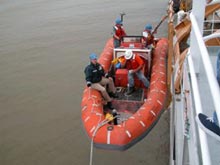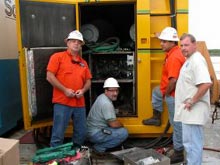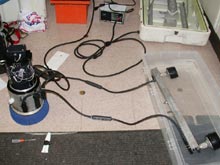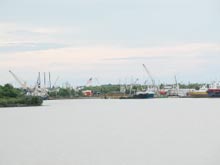
A small boat is launched from the Ron Brown to pick up the Welch generator technician and replacement parts in Venice, LA. (From left to right, front to back) Ron Brown Executive Officer, Wade Blake, Tim Jaramillo from Sonsub, and Wayne Smith and Vicky Carpenter, both crew members on the Ron Brown. Click image for larger view.
Challenges of Exploration
September 22, 2003
Catalina Martinez
NOAA Office of Ocean Exploration
We arrived on station at Viosca Knoll (view expedition map) at approximately 1 am, and the excitement and anticipation of the first ROV (remotely operated vehicle) dive quickly turned to disappointment as we learned that the huge Welch generator used to run the ROV was not working. The Sonsub ROV technicians worked throughout the night to try and fix the generator, but it was determined that the expertise of a generator technician was needed, as were parts specific to the machine, to get the massive motor back up and running. Thus, the decision was made for us to head in to the nearest port in Venice, Louisiana, to meet this specialized technician and to pick up the necessary parts.
After about a five-hour transit to the mouth of the Mississippi River, we steamed up the murky waterway and anchored offshore while a small boat was launched from the NOAA Ship Ronald H. Brown to pick up the technician from Welch Generator Company, Ronnie Hebert. Once on board, Ronnie fixed the generator quickly and tested it to make sure it was in proper working order.

Ronnie Hebert from Welch Generator replaces the burned out parts of the generator with the assistance of technicians from Sonsub and C&C Technologies. (From left to right) Greg Wardell of Sonsub, Ronnie Hebert from Welch Generator, Tim Jaramillo of Sonsub, and Jeff Ellett from C&C Technologies. Click image for larger view.
This "change of plans," although frustrating, allowed the science parties ample time to work out any remaining bugs in equipment and procedures. This work included fixing a digital video camera intended to remain on-site at a deep-water Lophelia bank at Viosca Knoll for several months. The camera had not been working properly, but with the assistance of Sonsub and C&C Technology technicians, the camera was returned to optimal working order within a few hours. This camera will be programmed to take five seconds of video every 30 seconds while on site, in an attempt to capture the true inhabitants of this very special habitat without the disturbance of an ROV or similar camera platform. The science crew of another cruise planning to transit through the area will retrieve the camera in November, and the mysterious world of Lophelia inhabitants will hopefully be revealed through the acquired video footage!

Test set-up of the digital video camera with strobes that will be deployed at one of the deep-water Lophelia sites at Viosca Knoll. Click image for larger view.
With a newly working generator and a great deal of enthusiasm from all on board, we headed back out to sea. All are optimistic that the weather will hold, and that our first dive at Viosca Knoll will occur first thing in the morning as initially planned. Stay tuned!






















